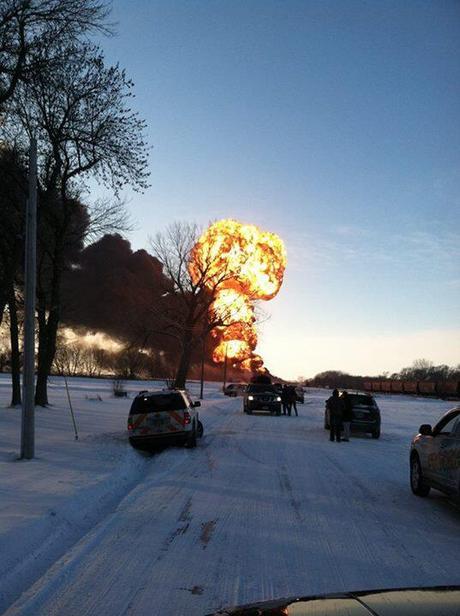
from Micah Grimes on Twitter
from Earth First! Newswire
A 106-car-long oil train derailed today and was hit by another train in Casselton, North Dakota, causing seven oil cars to explode as of 3:30pm.
Cass County Sgt. Dean Haaland reports that emergency responders are attempting to separate all other oil trains. Plumes of thick, black smoke are visible from 15 miles outside of town.
No injuries have been reported yet, however, City Auditor Sheila Klevgard has warned residents that “there is a Hazmat incident west of town.” Residents are advised to remain in their houses.
“The sky is totally black from smoke,” local resident Eva Fercho said. “I could almost feel the house shake in that (second explosion). It was loud.”
Amy McBeth, a BNSF spokeswoman Amy McBeth denies knowing the destination or point of origin of the train, but that the direction of the train was eastbound.
The Burlington Northern Santa Fe (BNSF) trains were likely from the Bakken Shale area, which is the highest-producing oil region in the mainland USA.
Bakken oil is notoriously flammable.
Earlier this year, a train running through Canada from the Bakken region derailed in the town of Lac-Mégantic, vaporizing half of the city center and killing scores of people.
Another train carrying Bakken crude derailed in Alabama in November, causing the explosion of 11 oil cars and 90-foot-tall flames.
A majority share of BNSF was purchased in 2009 by Warren Buffet, and has since risen from a relatively small corporation to the second largest railroad company in the US—almost entirely due to the increase of oil-by-rail networks programmed after the purchase of the railroad company by Warren Buffet.
Canadian oil-by-rail shipments rose from several hundred in 2009 to 140,000 this year. US oil-by-rail shipments rose more than 400 per cent from 2005 to today.
Oil-by-rail transportation is seen by the industry as an alternative to pipelines, which are meeting widespread popular resistance throughout North America. Opponents of oil-by-rail shipments insist that its rapid increase, matched with the several cases of derailments and explosions this year, prove it is an unstable and unsustainable practice.
Oil-by-rail terminals are proposed for the Pacific Northwest, including Vancouver, Washington.
On November 4, Rising Tide and allies shut down the Port of Vancouver in solidarity with locked out ILWU workers, and in protest against the Port’s approval of a Tesoro-Savage oil terminal that would receive and process oil-by-rail shipments from the Bakken shale and, likely, the Alberta tar sands.

